#Azula redemption
Explore tagged Tumblr posts
Text

redeemed!azula becomes zuko’s advisor
based on this post
#atla#fire hazard siblings#avatar the last airbender#atla fanart#my art#zuko#atla zuko#azula#atla azula#azula redemption#fire siblings#100#200#300#500#750#1000
1K notes
·
View notes
Text

I'm excited to post this commission by @ oakyvii of a future scene in my Azula redemption / Azulaang fanfic. It's are moment of Zuko and Azula getting along as they wander the palace grounds.
if you're interested please check out my fic here on AO3.
#avatar#atla#azula#zuko#azula redemption#azula centric#azula redemption fanfiction#azula redemption fanfic#fire siblings#siblings angst#atla fic#atla fanfiction#avatar the last airbender fanfiction#avatar the last airbender fic#post canon#azulaang#eventual zutara#fire nation
596 notes
·
View notes
Text
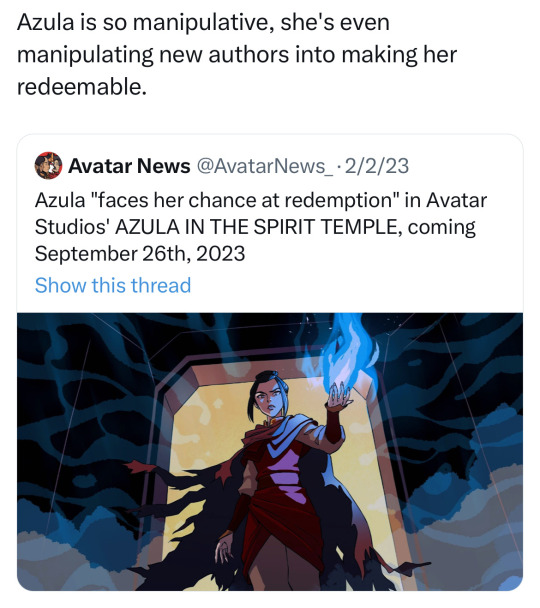
this is the funniest thing i’ve ever seen on atla twitter
6K notes
·
View notes
Text
Does anyone know who the artist of this work is? I've been looking for him for a long time🥺, and I can't find a trace (excuse my English, I'm using Google Translate)

547 notes
·
View notes
Text

@wingchunwaterbender @krista-kritical @local-enby
257 notes
·
View notes
Text
my favourite azula redemption arc is just azula chanting "im going to kill him later im going to usurp and kill him later just wait im going to kill zuzu in a moment" over and over and then just. never getting around to it. yeah girl you defo will kill zuko. its been four years and you've been helping him rule. totally part of the murder plan.
#she doesnt even change much she's just as delusionally villainous#but shes gotta get those shipping manifests looked over by the end of the week. killing zuko will have to wait#azula#zuko#azula redemption#atla
423 notes
·
View notes
Text

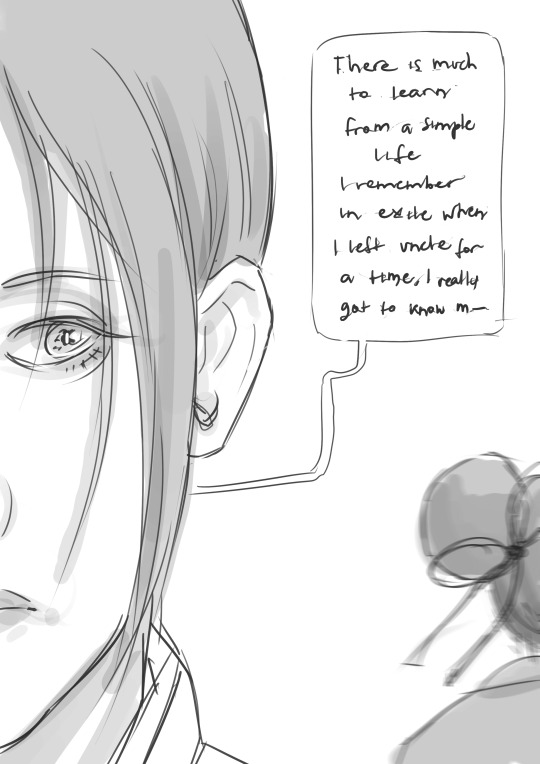

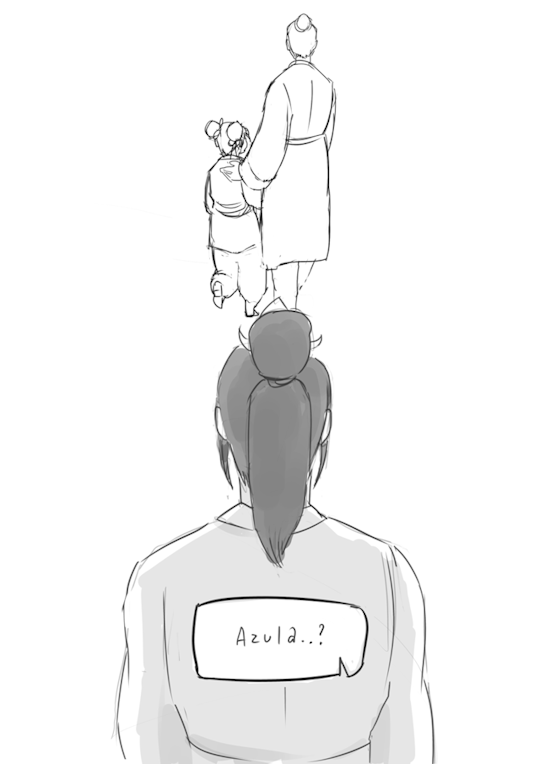
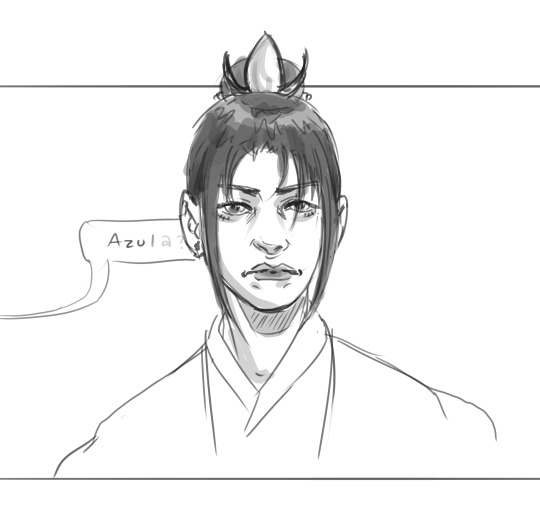
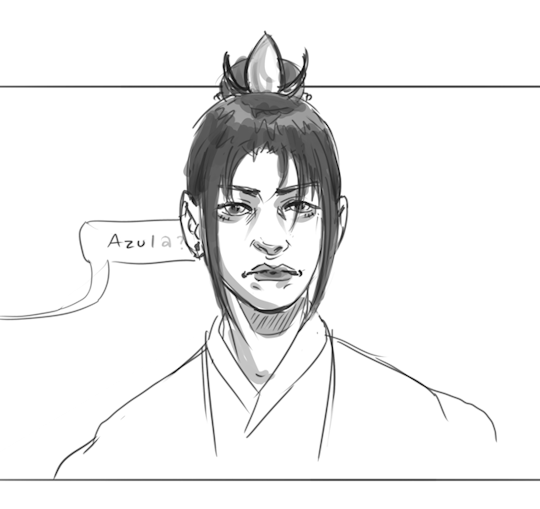
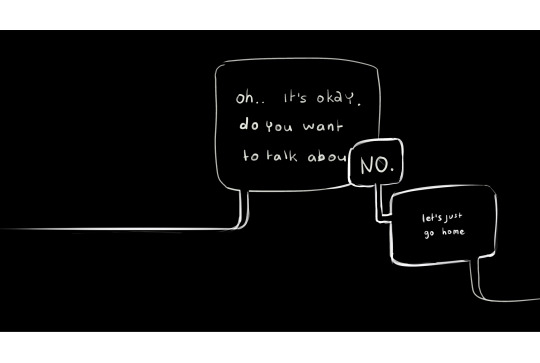
--- I had this idea at least 6 months ago and it did not look like this in my head BUT.. I am very familiar with the feeling of intense jealousy and sadness that comes with seeing a family dynamic that you envy.. And I feel like once Azula gets a chance to breathe and reflect, these emotions and the realization that her beliefs about her family were false and the man she idolized used her.. Well, it will hit her like a freight train..
791 notes
·
View notes
Text
Thanks to Azula in the Spirit Temple NOBODY can seriously, in good faith and convincingly argue that she's an irredeemable psychopath.
The evidence of her humanity is plain for anyone to see, the case is blunt, open and shut.
How long it will take for her happy ending is another matter but something tells me it's just a matter of time.
229 notes
·
View notes
Text
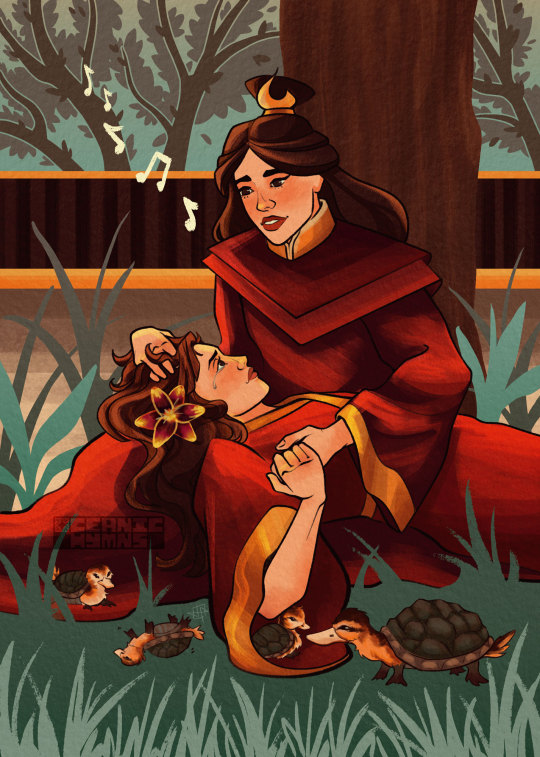
Excited to share one of my illustrations for @recovery-zine !
#avatar the last airbender#atla#azula#turtle ducks#avatar universe#ursa#atla azula#atla ursa#digital art#illustration#fanworks#zine promo#azula redemption#is something that can be so personally important to me
453 notes
·
View notes
Text
At Azula's funeral
Ty Lee: We will miss her so much.
Everyone nods.
Ty Lee: And she was so sweet.
Mai: 😐
Ty Lee: She was never angry.
Katara: 🤨
Ty Lee: She was never mean.
Aang: 🙃?
Ty Lee: She always had a nice thing to say.
Zuko: Am I at the wrong funeral?
Ty Lee: Never negative.
Azula: You most definitely are Zuzu...
Everyone screams in terror.
#avatar the last airbender#atla#azula#princess azula#azula redemption#ty lee#mai#katara#aang#zuko#fire lord zuko
355 notes
·
View notes
Text
The Narrative Potential of Azula's Redemption
Other people have made great points about why, at this point, the best direction for Azula's character to go is up, not the least because ATLA is a generally optimistic narrative, not like Game Of Thrones or some cynical, grimdark setting where only suckers have hope that people change for the better.
Azula changing for the better also clarifies and reinforces the central messages of the show, directly contradicting some "born bad" nonsense that the show explicitly rejects.
All that being said, Azula is, to me, a more subtle and complex character than her brother. Changing her role from straight-up villain to something more nuanced would be rewarding for fans of the show and a great way to mature the narrative beyond a simplistic good vs. evil conflict.
For instance, even if Azula comes to "see the light" about the Fire Nation and her role in the war, she can still be ruthless, cunning, and manipulative, which can put her at odds with more "honorable" characters. But if Team Avatar starts facing situations where right and wrong aren't always so clear-cut, having someone like Azula there to provide a radically different perspective would enrich the moral dilemmas a great deal.
At least, that's how I see it.
154 notes
·
View notes
Text
I hate when in fics, Ursa apologizes to Azula with a "Zuko needed me more," and the fic takes it like the best excuse on the world, and everything gets forgiven almost immediately after it.
Let's be honest, even for a first try is a really shitty excuse.
If I was on Azula's feet, I would be so pissed that I would need an apology for that apology
#avatar the last airbender#azula#atla ursa#azula redemption#my girl deserves a real apology#without excuses
254 notes
·
View notes
Text
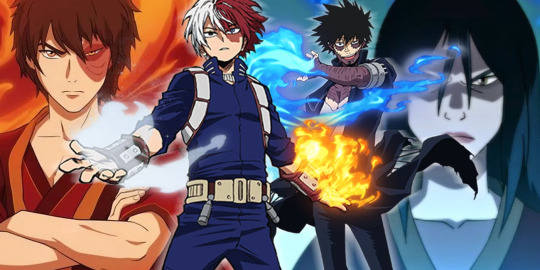
DOOMED SIBLINGS: THE TODOROKIS VS. THE FIRE NATION ROYAL FAMILY
I received an ask in my inbox about how Zuko doesn't owe Azula any forgiveness. Truthfully I wasn't even going to respond because this isn't an avatar blog, but then I watched this video.
Not only do I disagree with the basically everything in this video, but I am going to make the argument that both Zuko' and Azula's arcs are both incomplete with the way the show left the two of them in the final showdown.
In order to make my argument I'm going to compare Azula and Zuko's relationship in avatar to Shoto and Toya's relationship in My Hero Academia and use the latter as a more positive example.
Unnecessary Redemption Arcs
The common fandom opinion I want to argue against is this idea that Azula's ending is a perfect tragedy, and therefore doesn't need to be expanded upon. There's also a sentiment that redeeming Azula would somehow ruin the impact of this perfect tragedy.
I'm about to argue against both of these points.
Azula's arc doesn't work as a tragedy.
Because of this her arc is unsatisfying and unfinished.
I'm going to address the first bullet point but before that let me add another disclaimer. The reason why I think Azula's arc isn't an effectively written tragedy isn't because I like Azula.
Before we even get into the My Hero Academia comparison let me bring up something completely different. I do like Azula, but I like Terra Markov from Teen Titans a lot more and I would not change a thing about her tragic end.
AZULA'S ARC IS NOT A WELL-WRITTEN TRAGEDY
Terra in the comics is what a lot of people accuse Azula of being. She is stated in the text and by her creators to be an unfeeling sociopath. She was also never intended by her creators to be redeemed.
[About Terra] The very first time we see her, she’s trying to blow up the Statue of Liberty. It’s just that all the fans assumed because we went out of our way to make her cute — but not too cute, with the buck teeth and everything — everyone would assume that she was gonna become good by the end and that was never the case. First thing, we made a promise that day that we would never renege on our view that she’d never become good. It’s sometimes hard to do that with characters you like. You want them to become good or something like that. But we never liked the character enough—because we knew what we were doing with her—we never allowed ourselves to fall for the character. Because that’s bad. That’s bad storytelling. You’re doing what you want as a fan at that particular point, not as the creators. T
Now let me clarify, both creators of New Teen Titans say some nasty things about Terra and don't recognize her sexual abuse, but here's the thing. You don't have to read a story 100% the way the author intended, sometimes the story says one thing and the text says something different.
I am going to use Judas Contract as an example of a story where the character from the start was never intended to be redeemed and why that's a positive in this case.
Terra is a teenage girl, the bastard daughter of the king of Markovia and a random American woman who presumably has had no stable home her entire life because she's working as a mercenary at fifteen. She teams up with a man that is in his mid fifties and even starts a sexual relationship with him (this is statutory rape she cannot consent) and Deathstroke uses her to infiltrate the Teen Titans and learn as much as possible.
Terra is sent to live with the team and spy on them for several months. The whole time she only ever engages with them in a fake spunky persona, and never shows her real cutthroat self. She leads Beast Boy on in a fake romance to make him trust her and secure her place on the team. The way you'd usually expect this arc to go is that Terra would grow fond of the team and be torn in her loyalties.
Yeah, that never happens.
Terra loathes the Titans. In fact she's developed a superiority complex about her meta human abilities and she doesn't understand why anyone would use their powers to help others. She despises the concept of superheroes in general, and because of that never bonds with any of the Titans. Her feelings never change from start to finish, because her creators intentionally wrote her as a character that can't be redeemed.
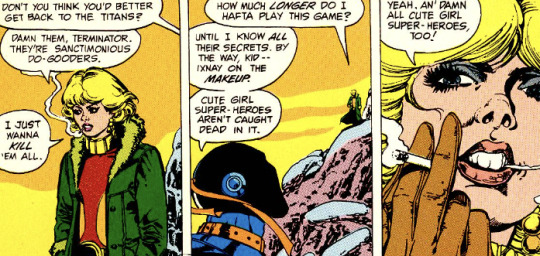
Terra is written to be a psychopath, but even with that intention in mind there are scene that shows a greater range of emotions. She has what could amount to a trauma flashback when Beast Boy too aggressively flirts with her and tries to kiss her and she reacts violently, trying to bury him under the earth.
Let's go ahead and interpret Terra as what is used as the fictional definition of a "sociopath" that is someone who feels no bonds with other people, someone with shallow emotions and someone devoid of guilt. Even if we interpret her that way, her story is still meant to be read as a tragedy.
Terra succeeds in her mission of infiltrating the Titans. Slade captures most of them, and the only remaining member Dick Grayson goes missing. Dick Grayson then unites with Slade's son Jericho, and the two of them team up in order to rescue the rest of their friends.
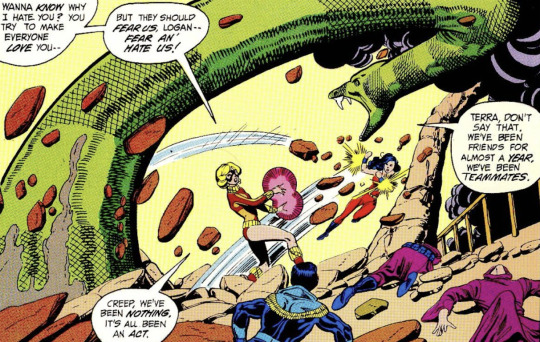
Even after all she's done the Titans try to make pleas to Terra during the final battle, which she not only rejects but responds to with violence. Which only confirms what I said above, Terra never grew to love them, she never regretted her actions, she only ever engaged with them with lies.
(Terra always lies, Terra always lies, Terra always lies).
Terra is declared by Raven to be devoid of emotions: "Her thinking is unlike ours. She feels no true love or hate. Her soul is corrupt. What she does is done without remorse."
Even after Raven declares this, however she still pleads with Terra to stop because she's going to hurt herself. Terra feels Slade betrayed her because he favored his son Jericho over her, so she decides to take both Slade and the Titans down. As the Titans fight her she begins to mentally fall apart ignoring their appeals to her and lashing out at everything around her. Eventually she makes one last attempt to everything around her, but the Titans escape and she only manages to bury herself.
At no point in the fight do the Titans give up on trying to reach her even as she's loudly screaming how much she hates them. Even after she's buried and it looks like she's dead, Gar and Donna both try desperately to dig her up on the slim hope she's still alive. When they find the body they even give her a funeral afterwards, even though they all think that Terra was beyond redemption.
Even the prose narration that accompanies her death is incredibly melancholy and bemoans her fate, at the same time as it calls her a outright sociopath.
There's no reasoning with her now. However slim, whatever sanity Tara Markov possessed is gone. Now there is only primal hatred! Hatred born, nurtured, and fanned. Hatred that festers and grows without care, without feeling, without plan. her pursed lips part and the sounds which echoes force are garbled and inhuman. Hot, boiling blood gushes wildly from the earth's open wounds, its skin fractures and cracks, and if a world could cry, it surely would. Her name is Tara Markov and she is little more than sxiteen years old, and due to the fault of no one but herself she is insane. No one taught her to hate, yet she hates without cause, without reason. No one taught her to destroy, yet she destroys with glee, with relish. Don't look for reasons which do not exist, plainly Tara Markov is what she is, and she has taken a great power and made it as corrupt as she. Hers was the power over the earth itself she could have brought life to deserts, hat to the frozen tundra, food to sraving millions. She could have damned raging rivers, and tunneled water to packed lands dry and dead. her powers were limited only by the mind which controlled them. A mind which sought not hope, not love, not life, but death.
If you go with the text that she is just a sociopath beyond redemption who hates and hates and hates for no reason, the narrative still mourns her because a sixteen year old with her whole life ahead of being consumed by hatred and then dying because of it is in fact sad.
If you read into the subtext then you can argue that the events of the story, contradicts what the narration is telling us. Terra is being sexually groomed and groomed as a child soldier by a man who is much older than her, even if she thinks he's a partner he clearly has all power in the relationship.
If you think about it that way then Terra is the ultimate bad victim. She doesn't cry and call for help as a victim of sexual abuse, instead she tries to claim power for herself, she manipulates, and she destroys any chance she had for a genuine relationship because she only sees all relationships as transactions she can gain or lose from.
Even if you only go with the first interpretation, the narrative still remains tragic because the Titans themselves did not want to give up on her, they did not want to watch this sixteen-year-old girl destroy herself. They never stop reaching out for her and it doesn't work, because there was no way out for Terra but death.
Here's the thing I don't think Terra's status as a sexual victim automatically means an ending where she dies is offensive. It reflects a reality that victims like Terra often go unseen because they don't present their victimhood in palatable ways, and by the time anyone notices it's far too late. Sometimes tragedies are meant to reflect a reality where many people do not get saved.
There's two reasons that Judas Contract works as a tragic story. Number one the creators planned Terra's ending right from the beginning. Which meant they never gave her any moment where she shows that she's redeemable. There's no genuine bond between her and the titans, no wrestling with the guilt of her actions, nothing.
Number two, Judas Contract is Terra's story from beginning to end. It begins with her betrayal of the Titans, and ends with her death. The death is also brought upon herself by her fatal flaw her hatred, which is what makes her the protagonist of a tragedy. Tragedies are stories where heroes are undone by their flaws. Terra also goes out on her own terms. She buries herself underneath her own rocks. Her death is a direct consequence of her inability to let go of her hatred. Terra's not fridged for anybody else's arc, she retains her agency until the exact moment of her death.
To simplify into bullet points, Judas Contract works because:
The creators thought out what they wanted to do with Terra.
Judas contract is Terra's story.
Now, getting to the part where we actually talk about Avatar, and I start complaining about that awful, awful video.
AZULA'S ARC IS NOT WELL THOUGHT OUT
I just went on a long tangent on how Terra, a character written to have no redeemable qualities can still be tragic. How the creators marked her as clearly doomed from the start, and how she brought about her end on herself, how there no redemption for Terra. How this girl had no real chance, and how regardless of the fact Terra is a lil baby sociopath her fall is still tragic because of how well structured the tragedy is surrounding her.
It's awful to kill off a sixteen year old victim of sexual abuse, but the ending just fits because Terra represents a certain type of bad, unsympathetic victim who doesn't get saved.
Azula's arc isn't as well structured. The ending does not fit. I'm going to start by refuting some points in the awful, awful video I did not like.
"Maybe it's okay if Azula's story ends where it does in the series we would separate how we would treat a real 14-year-old girl from a villain in a series, ad that's why any redemption arc isn't need i a story after all. A character needs of deserves a redemption arc when it becomes the most meaningful way to explore their character and place in the story, but a character deserving redemption usually comes before the story really needing it, and I don't think Azula's done anything to deserve it yet. They've got to exhibit some willingness and action to change..."
So the main reason I'm using Terra as my first example is because Terra is the kind of character that Hello Future Me is describing. Terra was written with the specific intention she'd never experience a change of heart, all of the friendships she makes with the Titans are fake, she very loudly experiences no remorse, or even self-reflection over what she is. Terra's pretty proudly a monster and she never experiences any kind of self-doubt or regret over what she's become.
I can disprove right away Hello Future Me's blanket statement (with no actual cited examples, just trust him guys) that Azula never did anything to hint she may deserve redemption. That suggests Azula is an entirely selfish character who uses, manipulates and thinks she's right and worst of all is comfortable being the way she is, and therefore incapable of doing the self-reflection necessary for change.
Azula does show the capacity to do selfless actions several times in the narrative, and even consider the feelings of others. There's the apology scene with Ty Lee and the way she interacts with her friends in general with the Beach where when she's not fighting in a war or trying to complete a mission for her father Azula 1) interacts with her friends in a normal way and 2) seems to express a desire to experience normal relationships not the hierarchical ones she's experienced all of her life.
However, that's not the example I'm going to use as her save the cat moment. I generally intend to interpret that as a sign that even though she treats Mai and Ty Lee as subordinates and that power she holds over them eventually leads to them leaving her, their friendship isn't just Azula abusing them and lording her authority over their heads 24/7.
No, Azula's save the cat moments all revolve around Zuko. Which is funny, because the entire fandom seems to regard Azula as Zuko's evil little sister who exists to do nothing but torment her.
The first and biggest is Azula deciding to bring Zuko home in Ba Sing Se, and telling a lie to her father that he was the one to slay the avatar.
Ozai: I am proud of you, Prince Zuko. I am proud because you and your sister conquered Ba Sing Se. I am proud because when your loyalty was tested by your treacherous uncle, you did the right thing and captured the traitor. And I am proudest of all of your most legendary accomplishment: you slayed the Avatar.
Zuko: [Shocked.] What did you hear? Ozai: Azula told me everything. She said she was amazed and impressed at your power and ferocity at the moment of truth. [Inspired partly by this post]
Now the show seems to regard this action as Azula being an evil temptress who is there to tempt Zuko back to her side with everything he thinks he ever wanted.
That's only if you regard it from Zuko's perspective.
Think for a moment from Azula's perspective. Number one, Azula is someone thoroughly indoctrinated into Fire Nation propaganda who measures her self-worth based on 1) military achievement and 2) her father's approval and assessment of her talents. In Azula's own logic (wrongheaded as it is) she's helping Zuko. She's bringing him back home with his place in the line of succession restored and his father's approval.
Azula doesn't benefit from this gesture at all, in fact if her father discovers the lie she has as much to lose as Zuko does.
Now Zuko insinuates that Azula only brought Zuko along and told her father that he was the one who killed the avatar so she could let him take the fall if the avatar turned out to be alive.
However, if you look at the actual order of events that doesn't make sense. Azula saw the avatar die, she didn't know about the spirit water, and therefore had no way of knowing Aang could come back. In fact, it's Zuko who 1) knew about the spirit water and 2) decides to keep the spirit water and the fact the avatar might have survived a secret that is throwing Azula under the bus. After all she has as much to lose as he did and instead of sharing that information with her he decides to keep it all to himself.
Now Azula does imply that if the avatar were to turn out to be alive all of Zuko's glory would dry up, but this is only after Zuko 1) throws accusations at her and 2) makes it's pretty clear he's lying to her putting her on the defensive.
This is also a scenario where Azula doesn't have much to gain by bringing Zuko back, if you look at it from her perspective. If Azula just lets Zuko rot in a ba sing se prison, then her claim to the throne is secure. With Zuko back he's restored in the line of succession. She also, when making the decision to invite Zuko to her side probably didn't need him for her plan to succeed.
There is a dramatic moment of Zuko choosing to side with Azula over Katara which turns the tide in Azula's favor, but Azula can't see into the future and therefore wouldn't be able to predict that happening. If you look at it from Azula's perspective she 1) successfully infiltrated the city, 2) already had the Dai Lee in her pocket. She likely already thought she had the city secure at this point so her decision to extend a hand out to Zuko is therefore likely motivated by selflessness instead of self-interest.
That's important because usually when Azula usually only gives her help to others if it also benefits her in some way. Azula might genuinely see her recruiting Mai and Ty Lee to her side as a member of the royal family extending her favor and giving them status and security in their positions but it has the underlying motivation of 1) she keeps them in a position to beneath her and therefore in her complete control.
Azula will interact with Mai and Ty Lee like friends on the surface, as long she maintains control over them, but if they do anything to something that displeases her she'll do anything to regain her control.
Mai: I thought you ran off and joined the circus. You said it was your calling. Ty Lee: Well, Azula called harder.
This is set up in Azula's very first interaction with Ty Lee. Azula greets her like an old friends, Ty Lee even seems happy to see her, but the second Ty Lee tries to say no to her Azula goes to extreme lengths to "persuade her". Azula's friendship with Mai and Ty Lee is an abusive friendship because there is a power differential and even if Azula feels genuine affection for them both it's clear they're not allowed to say no. Mai and Ty Lee are put into positions where it's in their best interest to please her, and live in fear of the consequences if they don't do just that.
Here's the thing, I'm not arguing that Azula didn't deserve any consequences for her actions. I'm arguing that the setup doesn't match her eventual ending. Azula is set up to have Mai and Ty Lee leave her from the very first scene that Azula interacts with Ty Lee. It's satisfying because the set up matches the pay off.
It's also tragic because it's Azula continuing the chain of abuse. The video isn't entirely wrong (which is why they came to the wrong conclusion frustrating).
Azula's fall is about how differenting parenting styles can a child. Ozai's affection is exchanged for being useful. Something Azula would go on to repeat with her friends, whereas Iroh's affection is something freely given with patience for imperfections and failures, something Zuko goes then on to repeat.
It's like... there it is it's so close. Here's the thing, Azula is set up for a tragic falling out with Mai and Ty Lee (and one she deserves) but the set up is different with Zuko. Azula's save the cat moment revolves around Zuko, and her genuine attempt to bring her brother home.
Yes, the first time Azula interacts with Zuko in season 2, she tries to take him home by force. However, by the ending of the season Azula's perspective on the matter has obviously changed because she begins by trying to bring him back as a prisoner, and by the end of the season invites him back as an equal.
There's no moment in Season 3 where Azula treats Zuko the way she does Mai and Ty Lee (unless Zuko provokes it first and puts her on the defensive) in fact most of her interactions are either them interacting normally (such as when Azula goes to find Zuko at their old beach house because she knows he'll be there and advises he leave instead of dwelling on their depressing memories) or Azula deliberately trying to look out for Zuko such as when she advises him not to go visiting with Uncle because it'll make others suspicious.
On the other hand, Zuko never at any point looks out for his sister the way Azula is demonstrated looking out for him. He doesn't say, try to tell her where he's going on the Day of Black Sun, or try to convince her the fire nation is wrong. There's a scene in the later part of Season 3 where Zuko is watching Azula fall to her death while sitting on a flying bison and not only sits there and does nothing about it, but sounds disappointed when she doesn't hit the ground and become an Azula Pancake.
That's pretty much the opposite of a save the cat moment. It's a "let the cat fall to their death" kind of moment.
Yes they were enemies at that point, but Zuko's the one who's supposed to learn that affection is something freely given with patience for imperfections and failures, something Zuko goes then on to repeat.
How exactly is he doing that in this scene?
The thing is... this setup doesn't have to be bad. Of course Zuko has trouble has trouble empathizing with Azula, he doesn't even think about sending a letter to Mai, Zuko's shown at this point to be like a healing abuse victim who's understandably focused on himself.
This in fact could be excellent set up with step 1) learning what genuine love and forgiveness is and 2) demonstrating those two things by applying it to others.
However, that's not where we got. We got Zuko watching his sister have a complete emotional breakdown, crying and screaming while chained to a grate and looking somewhat sad.
And once again to bring Terra into this, Terra is what Stay at Home and parts of fandom argue that Azula is. Terra screams at the top of her lungs how much she hates the Titans, how much she was always lying to them, and the Titans STILL try to reach Terra with words, try to de-escalate the conflict, when she's about to bring the rocks falling down on herself warn her she's going to hurt herself, and then when she's buried under rubble try to dig her out begging for her too still be alive.
Terra who's intentionally created by her writers to be as hatable as possible, is shown more compassion by the heroes in her ending than Zuko ever does to Azula. They also give Terra multiple opportunities to change until literally the very last minute, which Zuko doesn't do either.
What's set up is Azula has this save the cat moment with her brother, that Zuko is pretty much the only person she doesn't treat like a subordinate in the story (because she just like Zuko has a craving for familial love she tries to earn from her father). However, her ending with Zuko just taking her down doesn't fit that setup.
Azula's ending only fits if you consider her arc entirely from Zuko's perspective, which is the underlying issue. Azula's not the protagonist of her own tragedy, she's a plot object that's used to benefit Zuko's arc.
Azula's is written to have a downfall, the same way that Zuko loses everything at the ending of season 1 b/c of his inability to give up on the obsessive search for the avatar (and his father's love with it). Azula is written to be left by Mai and Ty Lee (this is the strongest point of writing when it comes to her since it comes from the beginning).
However, she's not written to be left completely alone and insane with the only empathy being shown is that her brother looks kinda sorta sad. That's only good if you view her as an object to further Zuko's arc, because isn't the ultimate culmination of Zuko beating his sister who has always been ahead of him at life? Azula needs to torn down completely without even some small glimpse of a hope of recovery so Zuko can be built up even moreor at least the writers of avatar seem to think so.
However, even Azula just existing for Zuko's growth and character development doesn't have to necessarily be a bad thing. This is where we get to MHA, which does the tragic siblings and the final Ag Ni Kai about 1000 times better with Shoto and Dabi.
THE GOOD
The comparisons between Shoto and Dabi to Zuko and Azula are made pretty often by the fandom. Shoto has a scar, Dabi has blue flames. Shoto has an arc about healing and learning what it means to be a hero, Dabi's arc is about self-destruction.
Dabi's not the center of his own story, he exists to foil Shoto and help Shoto reach the endpoint of his character development however that's not necessarily a bad thing. These are both two pairs of tragic siblings, the main difference is that MHA doesn't feel the need to tear down one sibling in order to build up the other. In fact, the final step to Shoto's arc is HELPING Dabi, not PUTTING HIM DOWN.
Not only that but the decision to help Dabi is a decision that Shoto makes on his own, and him going against the tide of a society that has already given up on Dabi and would much rather have Shoto shoot Dabi like a mad dog. Which makes the decision to do so even more powerful and emblematic of Shoto's growth.
Now you could say that Shoto and Zuko are too different to compare their arcs, Zuko has a redemption arc, and Shoto has what most people would probably term a healing arc. Shoto starts out the series as a hero.
However, this is what annoys me about the redemption arc debate. A redemption arc is really just a normal character arc. However, calling it redemption drags things like morality and forgiveness into the debate. if you take remove the discussion about moral philosophy both Zuko and Shoto have character arcs where they start the story defined entirely by their home situations and their father's abuse (hence why they have big obvious scars on their face), recover from their trauma, and go on to find an identity outside of their father and form healthy non-abusive connections with others.
In fact I'd see the theme of both arcs are the same, to literally find balance within themselves. Shoto is divided quite literally into right and left sides, fire and ice, and even seems to view himself as half of his father and half of his mother. Zuko is someone who's permanently marked and dishonored by the burn scar on his face. He suffers from an internal imbalance as well. Iroh says that Zuko is the descendant of both Roku and Sozin and therefore both pathways are open to him (but wouldn't that apply to Azula too). Zuko says to his father that the fire nation has destroyed the balance to the world and he's going to leave to assist the avatar in order to fix it.
Shoto's balance isn't just about fixing his internal trauma though, it's also about finding a balance between his family which has defined his entire life up until this point, and his desire to become his own hero not the hero his father groomed him into.
It's why the culmination of his arc is Shoto reaching out to save his family member Toya, because it's the ultimate balance in wanting to heal his family, and also the kind of hero he wants to be, someone who saves and brings peace to others instead of just violently putting down villains. He can bring peace to his family and become his own hero in one action.
However, let's go back to the beginning of Shoto's arc, because saving Toya as an endpoint to his arc is set up pretty early on.
Shoto's arc begins with Deku, a stranger breaking down Shoto's walls as an outsider in order to allow him to look past his own trauma and recall for the first time what he wanted outside of his resentment towards his father. This sets up the idea early on for Shoto that sometimes you need outside interference, help you didn't ask for, especially when you can't see outside of your own problems.
What Deku brings about ultimately is a change of perspective, Shoto's so hurt by the memory of his mother throwing boiling water in his face and everything that came after that he can't recall the memory of her telling him he could be who he wanted to be.
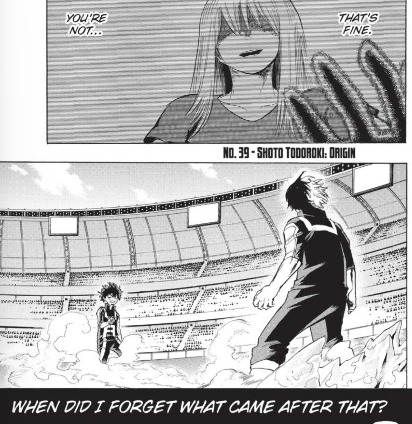
But, you want to be a hero right?
Shoto takes away two things from this arc, sometimes you need help even when you're not asking for it, and sometimes a change in respective is required in order to take the first step forward.
He goes to demonstrate these things multiple times, but here's two exaamples. The first Shoto demonstrates immediately after the tournament arc. When Iida is about to go down a dark path and commit a revenge killing on Stain. When, as a result of that IIDA is paralyzed and about to die in an alleyway, it's Shoto who both notices Midoriya and Iida are missing and shows up in the clutch. He's practicing the same thing that Deku taught him in the last arc: Giving help that's not asked for is what makes a true hero.
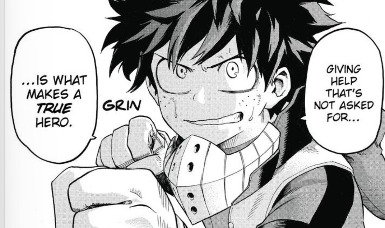
He even mentions the second idea, that a small change in perspective can be all it takes to save someone, and he wants to do for Iida hat Deku did for him. His words are the one who convinces Iida to stand back up again when he's paralyzed.
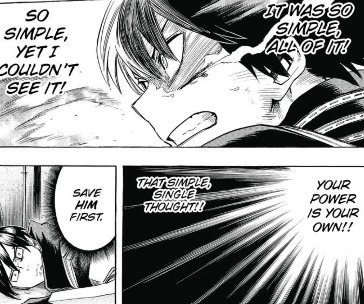
If you wanna stop this, then stand up. Because I've got one thing to say to you. Never forget who you want to become!
However Shoto's arc doesn't end here, because one of the major conflicts in MHA is that heroes don't pick and choose who to save and a true hero will give help even to those people who don't ask for it.
This is a point which further develops when Shoto's abusive father starts to show a change of heart at the end of the Pro Hero Arc. Shoto still holds his father accountable for what he did in the past, but he also acknowledges that if he had the capacity to change then so does Enji. This isn't about whether or not Enji is forgivable, this is an extension of what Shoto learned. Shoto originally believed he was controlled by the circumstances of his birth, that his fate was set in stone, but a change in perspective allows him to realize he can determine who he wants to be. So, Shoto is just applying what he's learned, Enji has the capacity to grow.
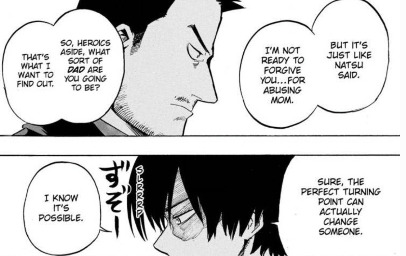
There's one final piece of setup that I want to cover before showing how these separate dies all culminate in saving Dabi. Shoto's not only someone who has to find balance between his family and his desire to be a hero.
The theme of balance is written into the quirk itself. Enji basically practiced eugenics to create Shoto as his masterpiece. He noticed a flaw in his own quirk where he could only make his flames so hot without overheating. So he arranged a quirk marriage with Rei who possessed an ice quirk to create a hybrid ice and fire quirk that he could use to cool himself off to prevent him from overheating.
Enji only ever cared about the fire half of Shoto's quirk. His ice quirk only exists for his flames to grow stronger. This is shown when Enji is trying to force Shoto to learn all of his signature moves, because he only cares about Shoto's flame quirk. Shoto was created to carry on his father's legacy, and surpass him with an even more powerful flame quirk. Part of his character development is him learning how to use his quirk in his own way.
This is a theme that continues in the class training arc where Enji is still repeating the behavior of trying to force Shoto to learn his signature moves instead of considering what he wants at all, because still Shoto only exists in Enji's mind to carry on his legacy.
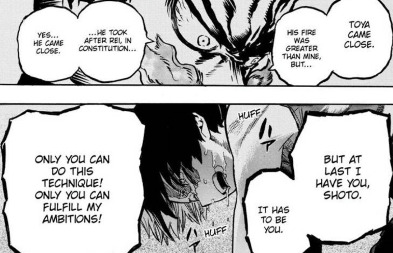
This all culminates in Toya's decision to save his brother. The first is his action in choosing to identify with his brother. If Shoto believes in his own capacity to change, and even his father's, then why would he deny Toya that same chance to change?
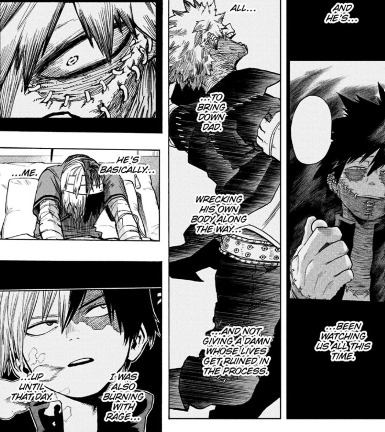
The foiling between Shoto and Toya isn't supposed to reduce the two of them to "Shoto is the good one, and he's the bad one", but instead Shoto and Toya were both in a point where they were consumed by hatred and couldn't see any other path in life. Therefore if Shoto was able to change because someone gave him help when he didn't ask for it, then Toya not only has the capacity to change - but in order for Shoto to stick to his stated beliefs that the smallest of things can bring about a change in people he has to be the one to give his brother that chance to change.
It's not about whether Dabi is worthy or not, it's about the themes in Shoto's arc finally being paid off.
Shoto's identifying with Toya, and even parts where he tells Bakugo he'll make Toya sit down and make Toya tell him his favorite food indicate that from the beginning Shoto's intention was to find a way to stop Toya without killing him (which is what several of the adult heroes were encouraging him to do).
@stillness-in-green does a more succinct summary of this plan.
Just me?
Because, like, Shouto had a plan. He spent the time between the two war arcs specifically developing a brand-new combat technique that he planned to use to shut down Dabi's combat advantage without killing him. He convinced his dad not to change the plan like Endeavor was hesitantly sounding him out about[1]; he went out and talked and asked questions, and even if they weren't the right words every single time, he did his best and he did it with intention. If Dabi proves to be dead, it won't be because of anything Shouto did to him; it'll be because Dabi himself chose to stand back up, take a warp gate across the country, pick a fight with the guy who doesn't have the power set to shut him down without unduly hurting him, and trying to replicate an Ultimate Move specifically tailored for someone with a balanced power set Dabi doesn't have. And if Dabi lives, it's still going to be because Shouto booked it across the country and used that same technique to stop him again.
Shoto's decision to save Shoto is also a continuation of his decision to help save Iida from Stain. It's not enough for Shoto to experience a change of heart about his own life, he's got to take what he learned about people's capacity to change, and the importance of connections and then put that into practice and help others the way he was helped.
However, it also further develops the theme of giving help that's not ask for from Iida because Shoto's not saving a mostly heroic kid, he's saving Toya to help break a familial cycle of abuse (because murdering the abuse victim isn't how you end the cycle of abuse... actually).
Shoto's last lines to Dabi are also a refutation of this idea of destiny that he once thought he was ruled by. It's once again, Shoto teaching someone else the lesson he learned. Toya says a warped rail can never mingle with a straight and narrow one! In other words Shoto can never understand or get along with Dabi, because Dabi will forever be defined as the failure because of the circumstances of his brith, whereas Shoto will always be the success.
His final action is a decision to break the cycle they were born into: no, we're gonna mingle whether you like it or not.
Shoto's ultimate move Phosphor is not only a move he designed far in advance to take down Dabi non-lethally, it also is a rejection of his father's teaching method. Toya says he only ever taught me how to turn up the heat. Enji only valued both Shoto and Toya for their flame quirks. Developing his own quirk and breaking away from what his father wanted, specifically in order to save his brother. It's Shoto rejecting what his father created both of them for (a successor to his quirk) and finding his own path. By using that move to take down Dabi he's not only teaching Dabi their flame exists for more than just destruction, he's also by letting Dabi live giving Dabi a chance.
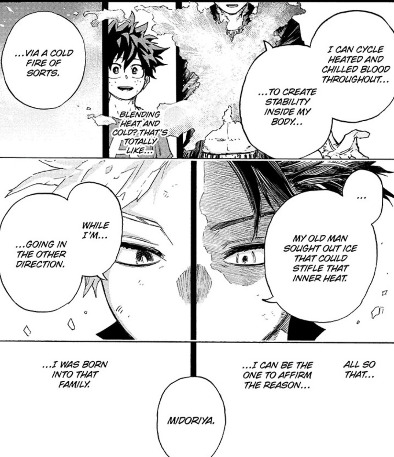
From a conversation with @class1akids
Dabi was the last push to unlock Shoto’s full power. Until then he was on the track of mastering flashfire like Endeavor planned for him (except for his own reasons) but realising the fighting Dabi with fire was gonna kill them both and also he’s simply no match fire only helped Shoto to fully take control of what his quirk is Like his quirk development goes parallel with how he faces each member of his family and finally meeting Toya is like the last piece of his puzzle to find his own full power and identity.
It's not just Shoto decides to save his brother because he's just that nice, his arc is literally incomplete without it. The act of creating phosphor a move specifically to save Dabi is both him unlocking the full power of his quirk (by balancing the fire and ice sides of his quirk) but also achieving balance between trying not to leave his family behind while at the same time becoming his own person and hero outside of his family circumstances.
Citing my conversation with class1akids again:
Toya is endangering everyone at Gunga. Endeavor has no means to stop him and when he tries to murder suicide Rei interrupts and his “hero way out” is taken. All he can do is watch helplessly as his family is about to burn to death with a bunch of strangers he tried to protect. But it would do Shoto dirty to use his heart technique to kill his family and the strangers so he comes in a clutch and I see that confrontation as the power trauma vs the power of healing in the family. With Shoto who is a true hero, they can put the fire out and save the family and strangertoo. Shoto become a balanced hero and bring relief and reassurance, Endeavor was completely helpless, and Toyas inner child got the attention he wanted, plus depending on how you read it, he may have become less suicidal.
Shoto also, and I want to point this out desires to stop his brother not to take him down but because he doesn't want him to hurt any more people. He's again finding a balance between two ideas 1) Shoto needs to stop his brother in order to stop him from creating more victims and 2) Shoto needs to find a way to stop him that's not just putting him down because Toya himself is a victim.
Shoto also, and I must point this out for the comparison between Zuko and Azula goes out of his way to engage Dabi in conversation, ask him why he didn't come home and what happened to him in the years after he died. This is especially poignant because unlike Zuko and Azula who grew up together, Shoto basically had no relationship with his brother (and the rest of his siblings really) before Toya died because Enji purposefully kept Shoto separate from all the "failures."
So yes, the act of saving Toya is more for the completion of Shoto's arc than any redemption arc for Toya but Toya's not just a plot object to move around for Shoto's arc, Toya has his own agency all throughout. In fact it's the fact that Toya resists being saved every step of the way that provides the challenge that Shoto needs to grow in order to be able to save him.
Toya's not just after revenge against his father that's the surface reason, Toya is also just blatantly suicidal. Toya's birth is marked as a failure, his death wasn't even acknowledged by his family and everything stayed the same in his absence, so he created Dabi while praying at his own shrine in order to mourn Toya. Dabi can't find any meaning in his life where he was born as a failure, so he'll use his death taking revenge against Endeavor for having been born in order to give his life meaning.
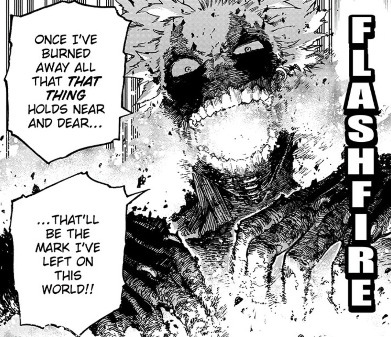
What makes Avatar look especially bad in its treatment of Azula in comparison to how MHA treats Dabi, is that Dabi is way, way less redeemable than Azula. For one Azula has clearly proven affection both her friends and her brother (and I don't think she even deserves Mai and Ty Lee's forgiveness they had every right to walk out on her and want nothing to do with her again.)
Dabi is probably the ugliest victim of the League of Villains. The rest of the league have far more moments in their bonds with each other. Toya is the outsider to the league even if there are some subtle hints to his affection (he tries to show up to save Twice, and also burns down Toga's family house to comfort her). The villains are mostly shown to be redeemable by their positive friendship with each other, and Dabi at several points denies the league's bond (he pulls a Terra and yells out loud at the top of his lungs none of the league matter to him). Unlike with Terra you can argue this is most likely Dabi trying to cover up his real feelings. However, the fact that he feels the need to hide his affection from the league shows he's purposefully distancing himself from any bonds whatsoever.
Unlike Azula who has gone out of her way to help her brother in one major way, and also shows hints in early season 3 of having that sibling bond with him Dabi just straight up wants to murk Toya. Azula also tries to murk Zuko, but that's only when Zuko leaves on the day of Black Sun (one without telling her, and two something that probably left her alone to deal with the consequences of lying to her father for his sake). Either way, Azula's behavior in early season 3 is setup for the fact that their sibling bond can be salvaged.
Dabi is way worse to Shoto in comparison. Dabi in the first part never saw Shoto as his own person, just a puppet of his father (puppets have no autonomy or personhood). His feelings towards Shoto only went so far as Shoto was someone who could kill in order to upset Enji. Dabi also doesn't particularly care for the rest of his family as well (only calling out Natsu's name when his brain is literally melting), they're either ways to hurt endeavor, or he wants to drag them in hell with him. Heck his last words after being saved is telling everyone to die and go to hell.
Dabi doesn't bother to make bonds with the league or have any lingering affection for his family because Dabi's determined to seslf destruct. He's given up on life the moment he saw that he died and nothing changed in that household, now all that's left is for him to create a meaningful death by dragging his family to hell with him.
Dabi is also even as a child made out to be an unpleasant victim. He attacks baby Shoto with his flames early on out of jealousy (even though he later admits that he was being unfair to Shoto). He makes the situation in the house worse by loudly screaming and demanding his father's attention. He screams at his mother and throws her complicity in Enji's abuse in her face.
This is in comparison to Shoto who in childhood flashbacks we are only ever seen either 1) crying, and 2) trying to comfort and protect his mother. Toya's even made out to be difficult to empathize with as a child - which like flew over half of the fandom's heads because he got accusations of somehow abusing his father and the rest of his family in that chapter at 10 years old. However, that in a way illustrates my point.
The fact that Dabi is so disliked by a certain portion of the fandom is because Horikoshi paints such an ugly portrait of Toya in the way he expresses his victimhood. It's done deliberately too, because number one Toya by resisting Shoto's attempts to save him and trying to self destruct instead retains agency as a character. He makes decisions even though they're bad self destructive ones, he's not just a prop. Number two, the fact that Toya is intentionally portrayed as such an ugly victim makes Shoto's decision to break the cycle of familial abuse by saving Toya and not leaving a single family member all the more poignant.
Toya is an uglier victim than Azula, actively trying to kill himself in a way that Azula isn't, and treats Shoto way worse than Azula ever treated Zuko and yet Azula isn't shown the sympathy or given the salvation that Toya is.
Because once again, the writers didn't think about the ending of Azula's arc or of Azula as her own character. Shoto defeating Toya is the culmination of his desire to break the cycle of abuse in his family. Zuko putting Azula down is just to make Zuko look better. It's in service of Zuko's character instead of both of their characters.
THE BAD
Avatar isn't setting up some gritty ending where the bad guys can't be stopped, they can only be killed. In fact it's pretty close in tone to MHA.
Season 3 especially is the season that really begins to hammer in on the themes that even the people on the enemy side are still human after all. The headband shows that Fire Nation children are indoctrinated into the war, but they are in the end still children. There's the story between Avatar Roku and Sozin, and once again Iroh saying that Zuko has both options becoming like Roku or becoming like Sozin available to him (but not Azula I guess). There's Zuko joining Team Avatar, even after he betrayed Katara in Ba Sing Se and should have burnt that bridge then and there. There's Zuko working to earn their trust again when no one on the team really owe it to him.
The main character of the show is a pacifist, who deliberately learns a way to stop Ozai without killing him before the final battle because he doesn't want to break the values taught to him by his culture.
If the entire theme of season 3 is redemption, healing and that the fire nation are not inherently evil then why does Zuko's sister and character foil end the last shot of the series screaming and crying with no one comforting or even attempting to sympathize with her. Why is this one character marked for tragedy in a show that is about redemption and healing and showing compassion to your enemies and very specifically not a tragedy.
Toya literally burns all of the flesh off of his body, and somehow he has a gentler ending than Azula, because at least Toya's arc ends with all the members of his family showing up to try to cool down his flames, and when he's on the ground burnt to a crisp his father finally apologizes to him. Toya is a skinless burnt chicken wing, my boy has no skin, and somehow he's better off than Azula.
I don't think the writers gave Azula such a cruel ending because they don't like her, but rather because they just didn't think about her ending outside of what it meant for Zuko. Which is why you get moments like Aang who is apparently a pacifist who doesn't want to kill the Firelord, watching his daughter fall to her death while sitting on a flying bison and doing absolutely nothing to save her. ALL LIFE IS PRECIOUS (except for Azula I guess).
It's not bad because a victim doesn't get saved, it's bad because it doesn't fit in with the rest of the story.
Not only is Zuko saving Azula a very natural conclusion to his arc, but there's far more setup for Zuko reaching out to his sister and saving her than there ever was for Toya and Shoto. Both Toya and Terra are screaming at the top of their lungs "I HATE EVERYONE, YOU SHOULD ALL JUST GO TO HELL." They're both making decisions and committing to their self destruction while Azula is a 14 year old girl having a mental breakdown.
Anyway, time to quote the bad bad video again.
"When does a villain deserve a redemption arc? When do we deserve a redemption arc? I know this is gonna hurt, but characters are not people. They are tools. They are represetations of people. They can be used to say other things. They can be symbolic representation of other ideas. Azula's story is not just about a fourteen year old defeated by her brother for the throne, Azula is Zuko's character foil, where she is ruthless and practical, Zuko is empathetic and emotional. Where Azula's a prodigy, Zuko has to work hard to earn eve a fraction of her power.
I specifically chose to cite MHA, because of how differently it decided to use Shoto and Toya's character foiling. Shoto recognizes himself in Toya, and how different their paths were in life. This is explicitly motivates him to save Toya. It's also the culmination of everything that Shoto has learned because Shoto is a hero who believes that actions speak louder than words. It's not enough for Shoto to resolve his own inner struggle, he also has to help Dabi with his because that's showing Shoto has grown rather than telling us.
I think that is where the major difference lies between Shoto and Zuko, we're told that Zuko has chosen the path of empathy and healing, that he's learned to give people love and patience like Iroh has but instead of showing that the culmination of his arc is having a fist fight with his sister in a denny's parkinglot.
Azula is Zuko's character foil, where she is ruthless and practical, Zuko is empathetic and emotional. Where Azula's a prodigy, Zuko has to work hard to earn eve a fraction of her power.
If Zuko is empathic and emotional and that is why he's gained friends while Azula is now alone after having lost her friends due to the way she treated them, then like... what a great opportunity for Zuko to SHOW that quality of empathy.
However, Zuko doesn't do anything that Shoto does in the final fight. He's not even here for Azula, Azula's just an obstacle for taking back the crown. He doesn't talk to Azula, engage her in any way, try to de-escalate and avoid the fight.
If you want to make the tragedy that Azula and Zuko have taken such different paths in life that that Zuko fighting with his sister is unavoidable you could um... at least show Zuko being sad over the prospect of fighting his sister or being reluctant in any way.
(Before you come in here with "Zuko doesn't owe Azula anything take" this isn't about whether or not Azula is a terrible sister to Zuko, this is about the story that avatar is attempting to tell. Shoto and Dabi's fight is tragic because Shoto doesn't want to fight Dabi, he wants Dabi to come home and for their family to be complete. Zuko never expresses anything like that so where does the tragedy come from?)
If it were 100% committed to a tragedy like Terra's death then I wouldn't mind. if it were 100% committed to a story of redemption like Shoto reaching out to Toya then I wouldn't mind. My issue arises from the fact they want to have their cake and eat it too.
They want to give this tragic end to Azula, and use it to illustrate how Zuko has grown as a character. However, you can't have both.
If Zuko's growth is about learning that his father's love based on achievement and 2) learning he needed to get lost in life in order to find himself then why doesn't any of Zuko's actions demonstrate this lesson Zuko has learned about love, and about how you can be your own person outside what your father expects from you.
If Zuko has grown as a character he should be able to show those actions. He does show his new understanding of love and friendship to Team Avatar, but as I said that's easy mode. That's Shoto's attempts to save Iida, it's a step in the right direction. It's also not really Zuko demonstrating a selfless love, because he's also at the same time trying to earn their trust and earn his way into the group.
It's also not Zuko breaking the cycle of abuse in their family in any way. Shoto is trying to break free from his role of his father's masterpiece, and at the same time helping Dabi break free from his view that he's the failure.
It's also such a natural ending for Zuko's arc, to take the lessons he learned from Iroh and give them to his sister who needs them so they can both break away from their father's parenting. As I said Zuko does solve the internal conflict within himself, but he doesn't really demonstrate that by helping someone else find their balance.
If you wanted the tragic end, then it would have to be about Zuko's failure to reach out to his sister, because he hasn't learned how to reach out to her. Or because he tries and is unable to. The writers don't seem to understand that though, they think the tragedy is about Azula bringing it all on herself, and not the inherent tragedy of a fourteen year old girl being unable to be saved.
The set up is right there too, because number one avatar is about balance. So, wouldn't the true ending be finding balance between the siblings, not having Zuko rise and Azula fall. Number two, Azula being alone and friendless because of her own actions is again a parallel to where Zuko was in early season 2 at his lowest point. Except Zuko can be the better person in this situation by reaching out to her.
Zuko doesn't break the golden child / scapegoat dynamic, he just flips it so now he's the success and Azula is the failure.
While Azula's fall comes from cruelty and rejection from friends and allies it is Zuko's humility and kindness and friendship that ultimately wins the day. Him sacrifcing herself for Katara and her bringing Azula down and then her healing him. Azula ending up imprisoned isn't something happening to a real person, it's a deliberative narrative choice by the author to say something about how people like this isolate themselves and end up alone. "
As I've stated above, I'm not saying Azula didn't deserve to take a fall. Her fall is actually set up from the first moment she met Ty lee. However, there's no set up for her fall being permanent.
Azula's given way more humanizing moments than characters like Terra or even Dabi. Which is why Azula being in an insane asylum for the rest of her life doesn't fit as an ending at all.
Azula is one link in the chain of abuse. Her father only gives out affection in regards to her usefulness. No matter what Azula is an asset first and a daughter second. Azula then repeats the cycle and treats her friends the same way. She has been shown through an improper model of parenting of using fear to dominate others with power and control and she replicates that in her other relationships.
Therefore, Ty lee and Mai leaving her is not only deserved, it's the perfect opportunity to pull the rug underneath Azula and to show her that her understanding of how relationships work is completely wrong.
This also mirrors Zuko's arc, because part of Zuko's arc is realizing just how wrong Ozai is for making both children earn his love, and that he doesn't need to measure his self-worth based upon his father's approval. He also learns about healthy expressions of trust and friendship from the gang.
Azula loses in part due to her own inability to form healthy relationships is losing people rapid fire, her brother leaves and joins the enemy side, Mai and Ty Lee betray her in favor of her brother, then her father in one action of leaving Azula behind and throws the title of Firelord to her after it's become completely meaningless reminds her of her place. Azula learns in about five episodes what Zuko had in 3.5 seasons to process that her father's love was always conditional and no matter what she did she would never truly "earn it."
People leaving Azula isn't exactly the problem, the problem is that Azula ends up alone permanently without being given the same chance that Zuko is. Terra, and Toya both get opportunities to turn back. They both refuse the hand that's reaching out to him. Mai and Ty Lee leaving is caused by Azula's own choices, but her ultimate end isn't. She's not even given the chance to turn away being saved like Terra and Toya do because Zuko doesn't even bother to try saving her. Her ending is not entirely brought about by her own choices, because the writers need her to take a fall to uplift Zuko.
Azula ending up imprisoned isn't something happening to a real person, it's a deliberative narrative choice by the author to say something about how people like this isolate themselves and end up alone.
I think once again it comes from the author's misunderstanding things because they don't want to look at the story from Azula's perspective, only Zuko's.
Stay at Home almost had it when he said the tragedy of Zuko and Azula was there to show how two different parenting styles affected these children.
The tragedy is that Zuko and Azula started in the same place, but Zuko had persistent guidance and someone who modeled for him a healthy kind of love. The difference is that Azula has never experienced any kind of healthy love or support on the level Zuko has, so she models all her relationships on the way her father treats her. It's not that Azula is offered some chance for change and rejects it, it's that Azula isn't even aware of the fact that there's another way because no one is there to show it to her.
Which is why I said once again, Zuko being the first one to show Azula the lessons he himself was shown by Iroh is such a natural place for his character to end.
Azula also even while completely alone and with no idea what healthy love is, knows that there is something wrong with her and is troubled by that fact in a way Dabi and Terra aren't.
Azula: I can sit here and complain about how our mom liked Zuko more than me. But I don't really care. My own mother... thoguht I was a monster... She was right of course, but it still hurt.
Then there's the famous mirror scene:
Ursa: I didn't want to miss my own daughter's coronation. Azula:Don't pretend to act proud. I know what you really think of me. You think I'm a monster. Ursa: think you're confused. All your life you used fear to control people, like your friends Mai and Ty Lee. Azula: Well what choice do I have?! Trust is for fools. Fear is the only reliable way. Even you fear me. Ursa: No. I love you, Azula. I do.
Both of these scenes indicate that Azula thinks of herself as a monster and is deeply uncomfortable with the idea. Considering Ursa is a voice in Azula's head and not a ghost, it also shows on some level Azula knew what she did to Mai and Ty Lee was wrong and feels conflicted over it.
Once again she's much more in conflict with herself than Toya and Terror ever are, and who's someone who's constantly warring with himself? Who's someone who could help resolve her inner conflict... Zuko (too bad the way the show's written he never does).
Azula doesn't choose to self-destruct the way that Terra and Toya did. Azula's ending isn't brought about by her choice not to change, because she's never given the chance to change in the first place. Her tragic ending would make sense if it was entirely of her own choices, but Azula doesn't retain her agency in the end it's literally taken away from her. She loses control of her mind, and her ending is being chained to a grate screaming and then thrown into an asylum.
I'm not arguing against Azula's ending because she's my favorite character and I don't want bad things to happen to her. It's because her tragedy isn't about her it's about Zuko, and her ending actively takes agency away from her where at least Toya and Terra both retain their agency up until the end. It's not good writing because the tragedy doesn't fit in with the rest of the story which is about balance and healing - and it's also ableist as hell.
THE UGLY
Azula's ending is unfitting to the tone of the story she's in, makes her and Zuko's arcs feel incomplete, and also is ableist as hell.
Here's yet more evidence that Azula's tragic ending is poorly thought out. Azula's mental breakdown doesn't exist in service of her character, but Zuko's.
Azula's issues pop up out of nowhere after episode 15, and take place over the last 6 episode of the series. The idea of Azula having a mental breakdown isn't necessarily a bad concept, but it's executed poorly.
The first way it's executed poorly is just how rushed it is. There's basically no hints of any mental instability beforehand. Of course people can have mental breakdowns spontaenously like that in real life, but this is a story and stories require foreshadowing. Azula spontaneously developing mental issues doesn't feel like it's planned as a part of an arc. First off, because the writers don't seem too sure about what Azula's symptoms even are. Hallucination, paranoia, manic laughter, but apparently she's still able to bend lightning just fine. Secondly, the writer's intentions for giving Azula a mental breakdown are pretty transparent.
The writer's room needed to come up with a believable reason why Zuko would suddenly be able to fight on equal terms with Azula, so boom sudden mental illness. The intent was not to create a sympathetic portrayal of a young girl struggling with both paranoia and delusions. The intent was to nerf Azula because they couldn't think of any other way this plot could end, other than Zuko and Azula fighting in a denny's parkinglot.
As I said they use mental illness as a plot device to take Azula's agency and choices away from her. It's not done with the intention of humanizing her, and in fact except for one small scene with her talking to her mother in the mirror it's a pretty negative and unsympathetic portrayal of mental illness. Not because the writers hate mentally ill people, but because they needed Azula to have a mental breakdown in order for a plot point to happen. Which is why they didn't think of the potential implciations of such a writing choice at all.
Now, people are going to argue about me so I'll use one final example. Azula's ending may be controversial but it's universally agreed upon that the Game of Thrones Ending was bad, right?
Game of Thrones uses mental illness as the exact same plot device, to explain why Daenerys Targaryen turns from a hero to villain in the last few episodes with absolutely no foreshadowing. In fact, the all of the show director's interviews about that choice are just blatantly ableist.
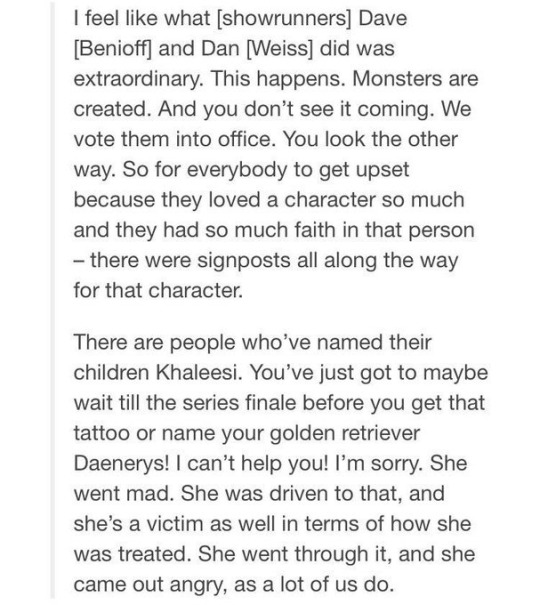
Rant from @hamliet
This quote is (likely unintentionally) gaslighting, ableist, terrible logically, and downright offensive.
First, ableism: why, why, why are we conflating madness with evil? She was driven to madness so she killed a bunch of people and had to be put down? And you think this is a great message in the year of our Lord 2019? [...] Additionally, while good writing is to an extent subjective, there are general consensuses on what make good writing--and Game of Thrones hit all the general consensuses for bad writing, from bad pacing to confusing character assassination. Critics are like, pretty united on this front. No one thought Dany’s turn made sense, even the ones who expect Mad Queen in the books. Maybe if people love a character who is meant to be evil you're not writing them correctly... or maybe they aren't meant to be evil.
Daenerys and Azula are incredibly similiar characters. They're both dragon themed, alligned with the element of fire, they're both colonizers they both represent the warrior princess archetype.
I'd say Daenerys is more of a tragic heroine though, because while Danerys is essentially doing the same thing as Azula, waging war in a foreign land and a culture that's not hers, for the purpose of then bringing back soldiers to her home continent so she can wage war again - while she is definitely a war mongerer she has good intentions. Daenerys for all of her faults, genuinely wants to break the chains and help out people.
I think Azula definitely sees herself as the hero for winning the war for the fire nation's sake, but she's completely uncritical of her own culture and she doesn't really have the good intentions that Dany has. She does it more out of a sense of duty, and her belief of divine right, not because she wants to break people free.
Daenerys's problem is that she doesn't understand the culture she's invading and the complicated world she lives in and despite all good intentions, is as I described above, invading a foreign power so she can go back and wage a war to reclaim the throne. Even if Daenerys would then proceed to go on to be the bestest queen ever that wouldn't change the fact her methods to get to the throne were incredibly violent, and she's sort of failing to break free from the cycle that led the Targeryen rule to fail in the first place.
Azula's problem is she sees herself as the hero and is therefore uncritical of fire nation values. She doesn't have any nobler intentions either other than service to her country, she just like Zuko is just trying to fulfill her duties as daughter and believe her birthright puts her above others. (I mean Dany does too but digressing).
Azula's more of a tragic villain who plays the antagonist role in the story, Danerys is one of the three heroes. However, she's more of a tragic villain in the sense that she's first season zuko pre character development just way more competent.
However, while Daenerys is a much more heroic character than Azula, here's the thing. I still think she's going to die. She is foreshadowed pretty heavily to die, and fail for her quest for the throne, because her entire story is a deconstruction of the warrior princess and the liberator archetype.
However, the story that GRRM is building throughout his books with Dany as an incredibly flawed heroine is different from what we got in the show, which was Daenerys going crazy and starting to murder people. That's because Daenerys turn to darkness wasn't about her character at all, it was just making her into a plot device to move their bad idea for a plot forward. That's why the turn is so unnatural and makes little sense with her character, that's why it's so rushed.
That's also why it's ableist, because it's using mental illness as a plot device to make a character unsympathetic and monstrous and give the other characters a reason to put them down.
The same for Azula, outside of one scene where he's talking to her mother, Azula's mental illness manifests in her screaming, maniacally laughing, looking like the joker did her makeup, and her instability also makes her violent and dangerous to be around. (Ignoring the fact that most people who experience delusions in real life are harmless, and more likely to be the victims of violence).
Her sudden mental illness isn't even used to make her more sympathetic in say Zuko's eyes and make him realize she's a victim, no it's just there to nerf her so she can be violently put down. The way she's drawn, the way she acts, it's to paint her as monstrous as possible. Her last action is like sobbing and screaming while being drawn as ugly as possible. She's not even given a small hope for recovery, because it just ends there. That's a pretty great message to send people that experience delusions, not only will you not recover or be shown sympathy, you'll also get sent to a mental asylum for the rest of your life. The choice for both Azula and Dany is not to portray any kind of mental illness in a respectful way, but to make a plot point happen.
As I said I expect Dany to die in the books, but there's a difference between dying as a tragic hero succumbing to your flaws but still having your good intentions acknowledged and just turning into a villain for no reason and being put down like a rabid dog.
(This is a quote I stole from a Shigaraki post but): "Why does she need to be put down in the first place, she has trauma, not rabies."
The problem isn't bad thing happened to my favorite character, the problem with the ending is it doesn't take Dany's setup into consideration.
Stealing from @hamliet again:
The thing about tragedies is that you have to manage expectations and clearly show that your tragic hero is doomed from the very early on–ie you have to show them making steadily worse and worse decisions (see: Eren Jaeger in SnK), if not directly tell your audience at the very beginning that this is a tragic story (ie see Greek choruses and Shakespeare, the prequels from Star Wars because everyone knows Anakin is Vader–plus I’d argue Anakin’s arc only works because we know he comes back to the light in the end. Audiences don’t like reversing on set up/undoing structure. To make Dany a tragic villain is to go against the structure of her arc in both show and book. That’s why people don’t like it, even if the books makes it seem more believable.
Kate then goes onto describe a character that's much more comparable to Azula's. Honestly Arianne is closer to Azula than Daenerys is.
You know who is set up as a tragic heroine destined to descend and die because of her flaws in the books, whose arc has almost certainly been combined with Dany’s in some sense in the show? Arianne Martell. (and another character known as f!Aegon) In the books, Arianne is incredibly ambitious, and especially resents her brother and his quest for power. Like Margaery (another tragic character), Arianne seeks power and is intelligent and manipulative in her quest for it. But Margaery’s fatal mistake is that in seeking power and prestige, she’s become more a pawn than anything else for a villain (Cersei). She chose to play with lions, and she’ll be torn apart; that’s not surprising. Arianne, as her chapters hint, is going to almost certainly marry f!Aegon, playing with fire, and die burning for it. Arianne’s grasping for her own power is never portrayed as cruel or stupid like the main human villain (Cersei); on the contrary, we empathize with a girl who truly cares about her people, but resents her father’s preferential treatment towards her brother. That’s the difference between Arianne and Cersei: Arianne cares. She is not cruel. But her pride is still going to get her killed.
There's a lot of game of throne females you could compare Azula to because GOT is full of queens, but like. Azula may be a tragic villain firmly on the side of the antagonists but she's not Cerseie. She's not queen, she doesn't wield the power that Cersei wields. In fact one of Azula's downfalls is finding out she doesn't have as much power as she thought she had, and ultimately was just a tool of her fathers.
She's not Rhaenyra or Alicent, because yes she may be grabbing for power but her character isn't affected by misogyny. Because once again, the writers simply didn't think about misogyny except for a really surface level "girls can be just as strong as boys" way so we really have no idea how women are seen in the fire nation. The show doesn't really explore if being a woman makes things harder, or makes people treat her differently than Zuko because the writers just didn't consider Azula's perspcetive on that matter.
Azula is alike to Danaerys in several ways, but as I said I think her ultimate end comes from Azula understimating her own importance in her father's eyes, and quickly realizing when her father is her only family left she never had his love or loyalty in the first place.
But Margaery’s fatal mistake is that in seeking power and prestige, she’s become more a pawn than anything else for a villain (Cersei). She chose to play with lions, and she’ll be torn apart; that’s not surprising.
Azula's most famous quote is about how Long Feng isn't even a player, only to find out her father considered her a pawn from the beginning and be broken by the revelation.
The difference being of course that Avatar is not Game of Thrones and it won't even kill the evil fascist dictator so it doesn't make a lot of sense to hand Azula the ending that Arianne got. They have the same fatal flaw.
Anyway, I made this big post but I can explain why Azula's tragic ending down't work in one sentence.
AVATAR THE LAST AIRBENDER IS NOT A TRAGEDY.
Maybe the reason Azula should get redeemed is because THE SHOW IS ABOUT F&%CKING REDEMPTION.
#bnha meta#mha meta#atla meta#azula meta#azula#princess azula#dabi#toya todoroki#shoto todoroki#azula redemption
369 notes
·
View notes
Text
Zuko saying fuck you to Ozai and just becomes a pirate out of spite are my favourite fics especially if his crew is the 41st division that he saved. Here are some of my headcanons for this:
- zuko actively starts working to stop his fathers tyranny, but he takes a long time to come to terms with it.
- I dont mind if it’s a crew he picked himself, love the oc’s
- he meets hakkoda and they become allies after a little disagreement because they are pirates.
- everyone knows he’s fire nation but be a of the reputation he built of going actively against the fire nation they don’t care
- he has a heavy bounty because the fire nation considers him a deserter
- he does not want anything to do with the avatar but still helps where he can
- the gang knows of him as the blue spirit or their little helper
- add slow burn Zukka
- spy Azula, like when they meet outside they are at eachothers throats but secretly helping each other
- Zuko doesn’t become a pirate right away. What happened first was that Zhao captured him and told every one that Zuko got killed ( it could be that he said it was a freak accident or something, or that Zuko was a traitor and his father ordered the kill) but Zuko escaped and then he became a pirate. Thing is that Zhao is the only one that knows Zuko is the infamous pirate, but he can’t tell anyone cause that means he lied/ wasn’t able to fulfill his mission.
You can use these ideas if you like
#avatar the last airbender#avatar fics#zuko#pirate zuko#zukka#azula redemption#just love the idea of Zuko just saying fuck you to Ozai#ug - 28
395 notes
·
View notes
Text
Aang: The path to inner peace begins with four words...
Azula: "Not my fucking problem"
#avatar: the last airbender#atla#avatarshitpost#atla aang#avatar#aang x azula#fire lord azula#azula redemption#team avatar#the last airbender fanart
1K notes
·
View notes
Text

Every damned time.
#atla#atla fanfic#avatar the last airbender#atla azula#azula redemption#ao3 fanfic#azula avatar#princess azula
234 notes
·
View notes